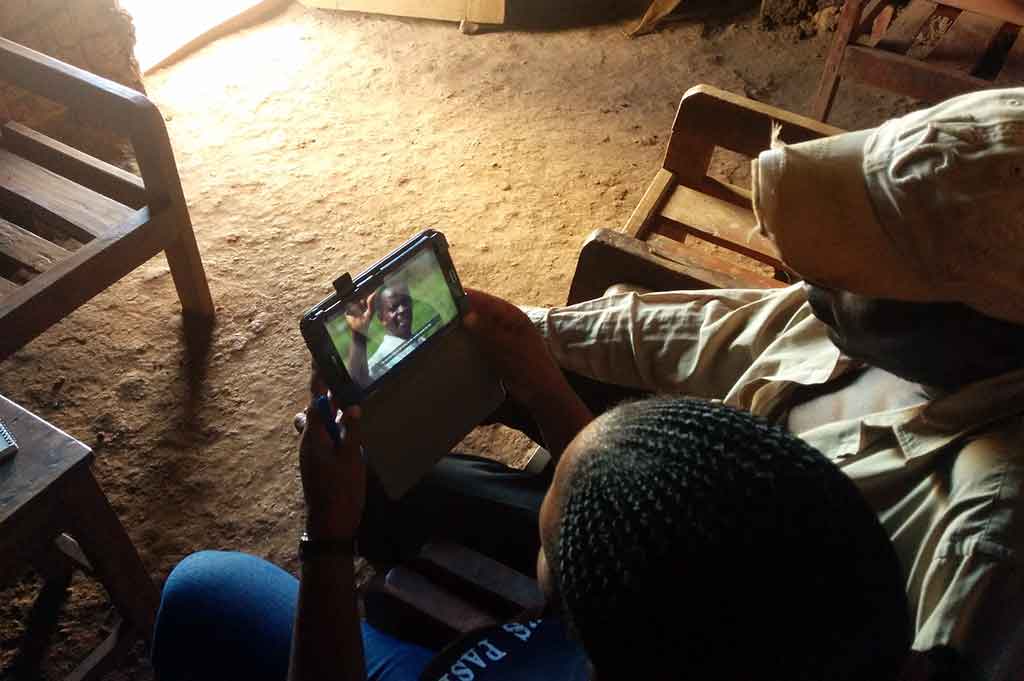
Using video to promote improved potato seed quality in southwestern Uganda – Preliminary results from a randomized intervention
In Uganda, low quality of potato seed is a major contributor to low potato yields among smallholder farmers. This finding was one of the main conclusions from an ongoing policy research project (PASIC). The research, led by the Ugandan Ministry of Agriculture, Animal Industries and Fisheries (MAAIF) with support from IITA, IFPRI and EPRC, collected socioeconomic and agronomic data on potato and rice farmers in Uganda to identify barriers to sustainable crop intensification.

While providing access to basic seeds, pathogen-free planting materials sourced from foundation seeds should remain a key policy priority; formal seeds systems in developing countries are often too weak to be brought to scale and farmers mostly rely on recycled seeds. Therefore, the research tried out two short-term, smallscale solutions at the farmer level that are likely to improve the available stock of seeds in the region.
A first solution tries to revive what is in fact an indigenous technology, but has been neglected somewhat since the government committed to providing access to basic seeds to farmers. It is a technique known as Positive Seed Selection (PSS) and has been shown to work in neighboring countries in field trials. Currently, just prior to the harvest, farmers are often hungry and in need of money. They will often uproot the strongest plants first and sell or eat the tubers. When the time comes to start planting potatoes again, farmers are left with the smallest tubers from weak and diseased plants, affecting the next harvest, leading to fast degeneration of the seed stock. PSS aims to turn this cycle around and teaches farmers to peg the strongest plants already at flowering stage for continuous followup. These strong and disease-free plants are then harvested first and stored as planting material. Only appropriately sized tubers with sufficient eyes are to be used.
A second solution being tried out in the field relates to proper seed storage and handling (PSSH). Again, currently many farmers store seed in bags in a dark corner inside the house without proper ventilation. This leads to poor seed quality due to rotting and poor sprouting. The approach explains to farmers the importance of storing seed potato spread out on racks in ventilated areas exposed to diffuse light.
Both solutions are explained as “information treatments,” where short infomercials to individual farmers are shown. One video shows the importance of seed quality and gives information on how to practice PSS. A second video shows the importance of seed quality and gives information on how to practice PSSH. The videos were shown to potato farmers in Kigezi subregion. Using baseline data, groups of four farmers were matched and randomly allocated to one of four treatments: the PPS video, the PSSH video, both the PPS and PSSH videos, and a control group that does not get to see any video.
During the first half of May 2016, these videos were shown to about 180 farmers at the time when the potato plants started flowering. Farmers will harvest in June 2016 and store potatoes for seeding in the second season of 2016. Planting for the second season is around August 2016. After this season, researchers will go back to the farmers for the end-line. It will then be determined if PSS and/or PPSH “worked” by comparing outcomes (such as potato yields (kg/ha) or price received for potatoes sold) between farmers that were shown the video(s) and farmers that were not. More information about the project can be obtained from the pre-analysis plan.
